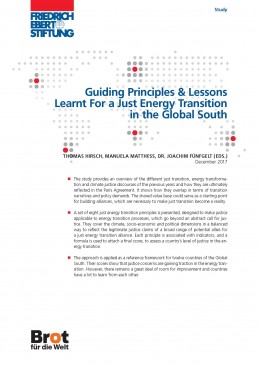
This study by Friedrich Ebert Foundation and Brot für die Welt provides an overview of the different just transition, energy transformation and climate justice discourses and how they are reflected in the Paris Agreement. A set of eight principles is presented, designed to make justice applicable to energy transition processes which go beyond an abstract call for justice. The approach is applied as a reference framework for twelve countries of the Global South. SD Strategies contributed two country cases: Costa Rica and Jamaica.
The renewable energy sector has a huge potential for creating jobs. Jobs in the RE sector are created directly and indirectly along the entire value chain. If we ensure that these jobs have decent working conditions in terms of health, salaries and benefits, then they can be clearly preferable to jobs in the traditional energy sector. The concept of ‘justice’ is one that unites and encompasses every movement and stakeholder involved in the global energy transition. But how can we define and assess countries’ efforts towards incorporating justice into their energy transitions? This study identifies the principles and criteria for such a just energy transition through close examination of the Nationally Determined Contributions (NDCs) of 12 selected countries from the Global South, and additionally assesses these countries using the determined criteria.
